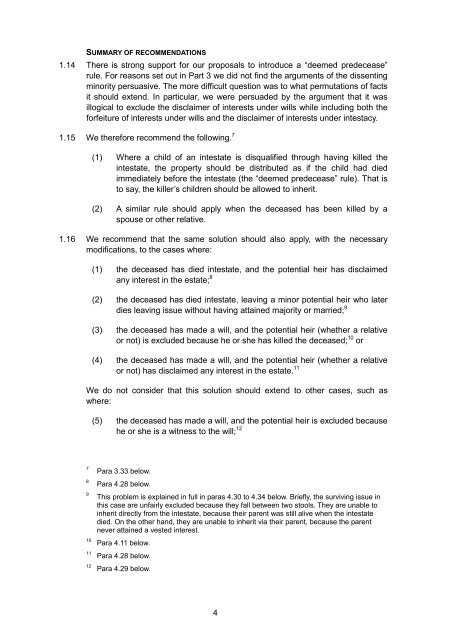The Forfeiture Rule and the Law of Succession ... - Law Commission
The Forfeiture Rule and the Law of Succession ... - Law Commission
The Forfeiture Rule and the Law of Succession ... - Law Commission
Create successful ePaper yourself
Turn your PDF publications into a flip-book with our unique Google optimized e-Paper software.
SUMMARY OF RECOMMENDATIONS<br />
1.14 <strong>The</strong>re is strong support for our proposals to introduce a “deemed predecease”<br />
rule. For reasons set out in Part 3 we did not find <strong>the</strong> arguments <strong>of</strong> <strong>the</strong> dissenting<br />
minority persuasive. <strong>The</strong> more difficult question was to what permutations <strong>of</strong> facts<br />
it should extend. In particular, we were persuaded by <strong>the</strong> argument that it was<br />
illogical to exclude <strong>the</strong> disclaimer <strong>of</strong> interests under wills while including both <strong>the</strong><br />
forfeiture <strong>of</strong> interests under wills <strong>and</strong> <strong>the</strong> disclaimer <strong>of</strong> interests under intestacy.<br />
1.15 We <strong>the</strong>refore recommend <strong>the</strong> following. 7<br />
(1) Where a child <strong>of</strong> an intestate is disqualified through having killed <strong>the</strong><br />
intestate, <strong>the</strong> property should be distributed as if <strong>the</strong> child had died<br />
immediately before <strong>the</strong> intestate (<strong>the</strong> “deemed predecease” rule). That is<br />
to say, <strong>the</strong> killer’s children should be allowed to inherit.<br />
(2) A similar rule should apply when <strong>the</strong> deceased has been killed by a<br />
spouse or o<strong>the</strong>r relative.<br />
1.16 We recommend that <strong>the</strong> same solution should also apply, with <strong>the</strong> necessary<br />
modifications, to <strong>the</strong> cases where:<br />
(1) <strong>the</strong> deceased has died intestate, <strong>and</strong> <strong>the</strong> potential heir has disclaimed<br />
any interest in <strong>the</strong> estate; 8<br />
(2) <strong>the</strong> deceased has died intestate, leaving a minor potential heir who later<br />
dies leaving issue without having attained majority or married; 9<br />
(3) <strong>the</strong> deceased has made a will, <strong>and</strong> <strong>the</strong> potential heir (whe<strong>the</strong>r a relative<br />
or not) is excluded because he or she has killed <strong>the</strong> deceased; 10 or<br />
(4) <strong>the</strong> deceased has made a will, <strong>and</strong> <strong>the</strong> potential heir (whe<strong>the</strong>r a relative<br />
or not) has disclaimed any interest in <strong>the</strong> estate. 11<br />
We do not consider that this solution should extend to o<strong>the</strong>r cases, such as<br />
where:<br />
(5) <strong>the</strong> deceased has made a will, <strong>and</strong> <strong>the</strong> potential heir is excluded because<br />
he or she is a witness to <strong>the</strong> will; 12<br />
7 Para 3.33 below.<br />
8 Para 4.28 below.<br />
9 This problem is explained in full in paras 4.30 to 4.34 below. Briefly, <strong>the</strong> surviving issue in<br />
this case are unfairly excluded because <strong>the</strong>y fall between two stools. <strong>The</strong>y are unable to<br />
inherit directly from <strong>the</strong> intestate, because <strong>the</strong>ir parent was still alive when <strong>the</strong> intestate<br />
died. On <strong>the</strong> o<strong>the</strong>r h<strong>and</strong>, <strong>the</strong>y are unable to inherit via <strong>the</strong>ir parent, because <strong>the</strong> parent<br />
never attained a vested interest.<br />
10 Para 4.11 below.<br />
11 Para 4.28 below.<br />
12 Para 4.29 below.<br />
4
















